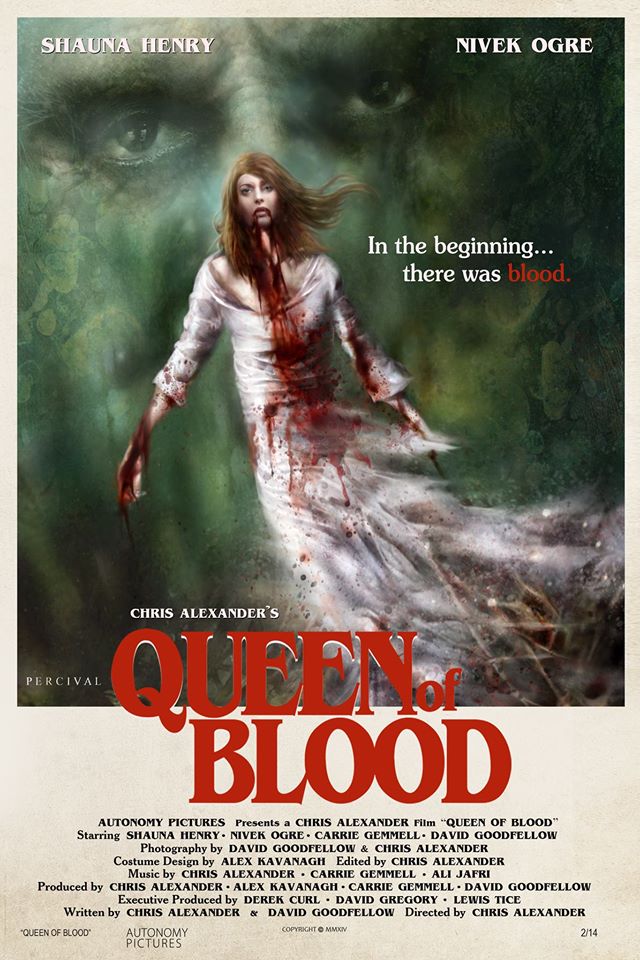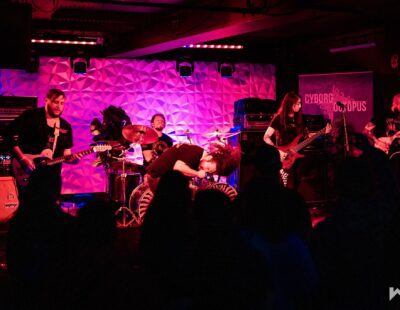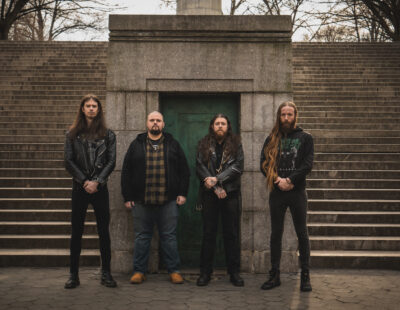Even those who don’t find the exquisite cacophony of Skinny Puppy all that alluring would be hard pressed to deny frontman Nivek Ogre is a singular artist and consummate performer. We’re talking about a man who on a trio of instant-classic albums a couple decades back — Rabies (1989), Too Dark Park (1990) and Last Rights (1992) — basically redefined sonic abrasiveness even while teasing real beauty out of the sinister chaos he himself helped set in motion. Of late Ogre has continued to evolve his sonic attack and, perhaps a bit more surprisingly, revamped and re-imagined his considerable skill-set for the silver screen, turning in a series of intense, luminous performances in films such as Repo! The Genetic Opera, 2001 Maniacs: Field of Screams, The Devil’s Carnival, and Queen of Blood, the follow-up to director Chris Alexander’s super-textured, avant garde creepfest Blood for Irina.
Ogre was recently kind enough to chat with Decibel about his trip down this new — and, as we shall see, complimentary — avenue of expression…
I imagine all those years of live performances with Skinny Puppy — a very theatrical, cinematic band — must’ve helped inform your transition into the world of acting.
Well, I definitely had quite a bit of body/gestural work to draw on. Acting, though, was still very difficult at first. There are some similarities between the two worlds, obviously, but working in front of a camera — which picks up every nuance, every detail — can be a very intimate thing and requires its own box of tricks. That’s a huge difference from rock n roll where the stage and the volume and the decibels create this huge divisive wall between you and the spectators, crew, and everyone once the show begins — everything you do up there is over-exaggerated and very big to reach back into the audience as far as possible. In my case I was very lucky to be given an easing step into acting with the character of Pavi from Repo! the Genetic Opera — we recorded all the vocal stuff ahead of time, so in front of the camera I wasn’t having to worry about lines so much as just bringing the character down in size from what I’m used to on stage to something that would work on film. It provided me the time and space to focus on what was for me the hardest aspect of the enterprise. The other great thing about Repo is that I was lucky enough to able to come up to Toronto for a month after we recorded everything and take this Lon Chaney Sr. route of just hanging around behind the scenes and learning as much as I could about the way certain things are done, set etiquette, everything. And I was totally up for checking it all out — still am! Filmmaking remains an amazing, intriguing process to me.
Before Repo was acting a possibility in the back of your mind? Or was it just something that came up with this role that you tried and happened to enjoy?
Oh, sure, I’d thought about it. I mean, who the fuck wouldn’t want to be a part of all of this? And from a very young age, back in the time of [legendary make-up effects artist] John Chambers and Planet of the Apes, I was fascinated by the worlds movies could create and loved magazines like Famous Monsters of Filmland and Genii, The Conjurors’ Magazine that celebrated these illusions and creatures I found myself drawn toward. As a child I always identified with the monsters and things on the outside and dark protagonists. Without even knowing it, really. For whatever reason that was the path I was set on… And it just continued to develop — from, you know, sneaking into The Exorcist in high school to going to see High Tension on the Saturday morning after it came out and feeling my breathing get a little weird because of how deliciously and expertly Alexandre Aja could build suspense. It’s just always been a part of my life and the way I see things.
It’s interesting to hear the roots of your love for genre films go so deep. Instead of Why are you acting now? the question almost becomes Why haven’t you been acting all along?
Well, honestly, my first experience with acting was an awful one.
And that was?
I auditioned for the role of Funboy in The Crow. That’s where for the first time I really hit that wall of Whoa, this is very different than being on stage. The read was with male assistant director who was playing the female opposite me in a kind of sexy situation. I’m right up in his face and behind him, around this wall in a smaller room in the darkness, were the producers. I just lost my shit trying to make this work and thought, This isn’t for me. And I wasn’t really ever able to get comfortable with the idea again until Repo gave me a chance to re-approach it in a way that made more sense to me — and, also, after I’d done some work on my own in the meantime. I have this friend who is a bit of a Renaissance man, and acting is one of the things he has an interest in, and he taught me how to do a personality breakdown of a character and more. He told me, “You already kind of know all of this instinctively from being on stage — you perform in this in Grotowskian, Polish Laboratory Theater way.” Which I realized was true. So it became a matter of connecting the dots for me — which is what I’m still doing!
Speaking of connecting the dots, your interest in the dark side of cinema must have had an effect on the music you eventually made, right?
One-hundred percent. I think Skinny Puppy was kind of a trainwreck in a lot of ways, but what we were seeking to do — looking for some kind of positiveness in all the misery and horror of the world, and bringing together my deep-seated empathy for animals and the lower things with my identification with monsters and the downtrodden — is not all that different than what the films that I saturated myself with during a certain psychedelic, formative period of my life were trying to do. I’ve since come to the conclusion that all these movies and a lot of these songs are very much dark fairy tales — cautionary tales for ourselves and our society that reveal to us some of the darker parts of our nature that should be confronted not repressed.
Since Repo you’ve acted in several films. How have things evolved for you in this new arena?
Once I adjusted to the initial nervousness of being on a soundstage with my pants down while people are working all around me — and figured out, you know, that’s just every day life in moviemaking world! — it became great fun. In Devil’s Carnival I actually found myself disappearing into the character and the make-up during scenes despite the million things going on around me and that’s kind of the full-immersion place I want to get to in my acting. I worked with Lin Shaye on 2001 Maniacs — a lovely woman, and so kind to me — and the thing I took away from watching her work was this subdued intensity she could bring to her work. That’s the goal. Also, I’ll say this: It’s been wonderful in the sense of not being the frontman — working as part of an ensemble and not having to carry the whole show. Supporting character, it turns out, is a role I actually really enjoy!
Let’s talk Queen of Blood. When I interviewed director Chris Alexander about the film, he talked about what an great experience it was going out into the woods with you and getting you to vomit blood on command — which you’re apparently quite skilled at!
[Laughs] I hope so!
And prepping for this interview I thought a lot about how you’ve both taken a very different path than most, and both have a very unorthodox way of approaching your respective artistic endeavors. Do you see Alexander as something of a kindred spirit?
Absolutely, absolutely. What I like about Chris is that he not only has a vision, but, more importantly, he actually has the balls to follow through on it. His scope of knowledge regarding film is massive, but he uses that knowledge as a foundation to build on, not a library to mimic. That differentiates him from many, many other filmmakers, in my view. I’m curious to see where he’s going to take us as he gains more tools and makes more movies.
It sounds like he gave you a role you could really sink your teeth into.
He did! A bipolar, sacred schizo preacherman — what could make more sense for me! [Laughs] I got to give my cheesy nod to Robert Mitchum in Night of the Hunter and Chris also gave me the space to play around with this abstract character, even with what short time I had — little things like carving the cross that would be my character’s defensive weapon of sorts. I’ve learned that’s what all of this is about — being creative in ways that serve the production and having fun with it. Chris was definitely supportive of that.
We talked earlier about how your stage work informed your acting. Has the reverse been true as well? Have you found tricks you’ve learned via acting sneaking into your live performances?
Definitely. In music, I created a kind of insular world for myself even within Skinny Puppy, so breaking through walls in acting certainly expanded the range of what I thought was possible in my work overall. I mean, right around the time I started seriously acting I released a solo record called Devils in My Details, which has friggin’ tuba on it, so… [Laughs] But, yeah, acting has opened up the improvisational aspects of what I do, and I think — I know — that has freed me up to be more spontaneous on stage. Also, in real life I am reclusive, so it has been good to put myself out there. We grow when we challenge ourselves. And this has definitely been a great challenge. So the one feeds the other, like all things in life do.
It must also be gratifying to know your accomplishments in music are impressive enough to help open the door for you to find an outlet for this other passion.
It is. You know, I thought Skinny Puppy would maybe last for one album — basically a great experience that would be over in a flash. Yet, here I am, lucky enough to be talking to you about this little branch off my main artistic trunk taking me into another dream I get to fulfill. It’s very surreal, to be totally honest. Had I not followed that strange muse and accidentally developed a cult following — which is what I think we’re talking about here — who knows what would’ve become of me? Sometimes going down this path has been exhilarating, other times it’s depressing, but I believe the because I’ve taken responsibility for the good and the bad of I’ve never disenfranchised, only a need — and an ability — to explore more. I’m grateful for that.
Do you see yourself expanding your acting palette beyond genre film?
Anything is possible. I could definitely see myself doing more dramatic roles, though probably with a darker edge. I was born and raised on monsters, as I suggested before, and I’m drawn toward the weird in general. That said, I would never turn anything down based on some preliminary prejudice. I think I’ve busted my cherry as far as my feelings of insecurity as an actor goes, and I’m not looking to put limitations on where I go from here.










